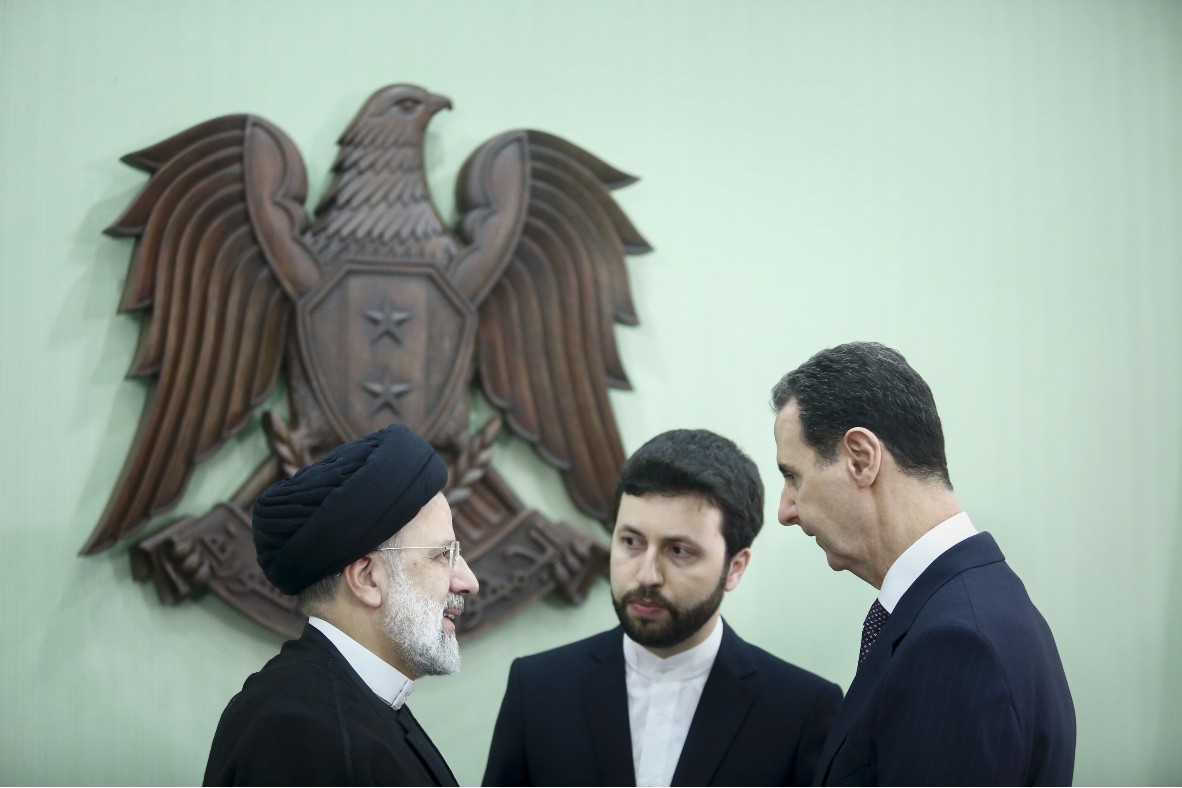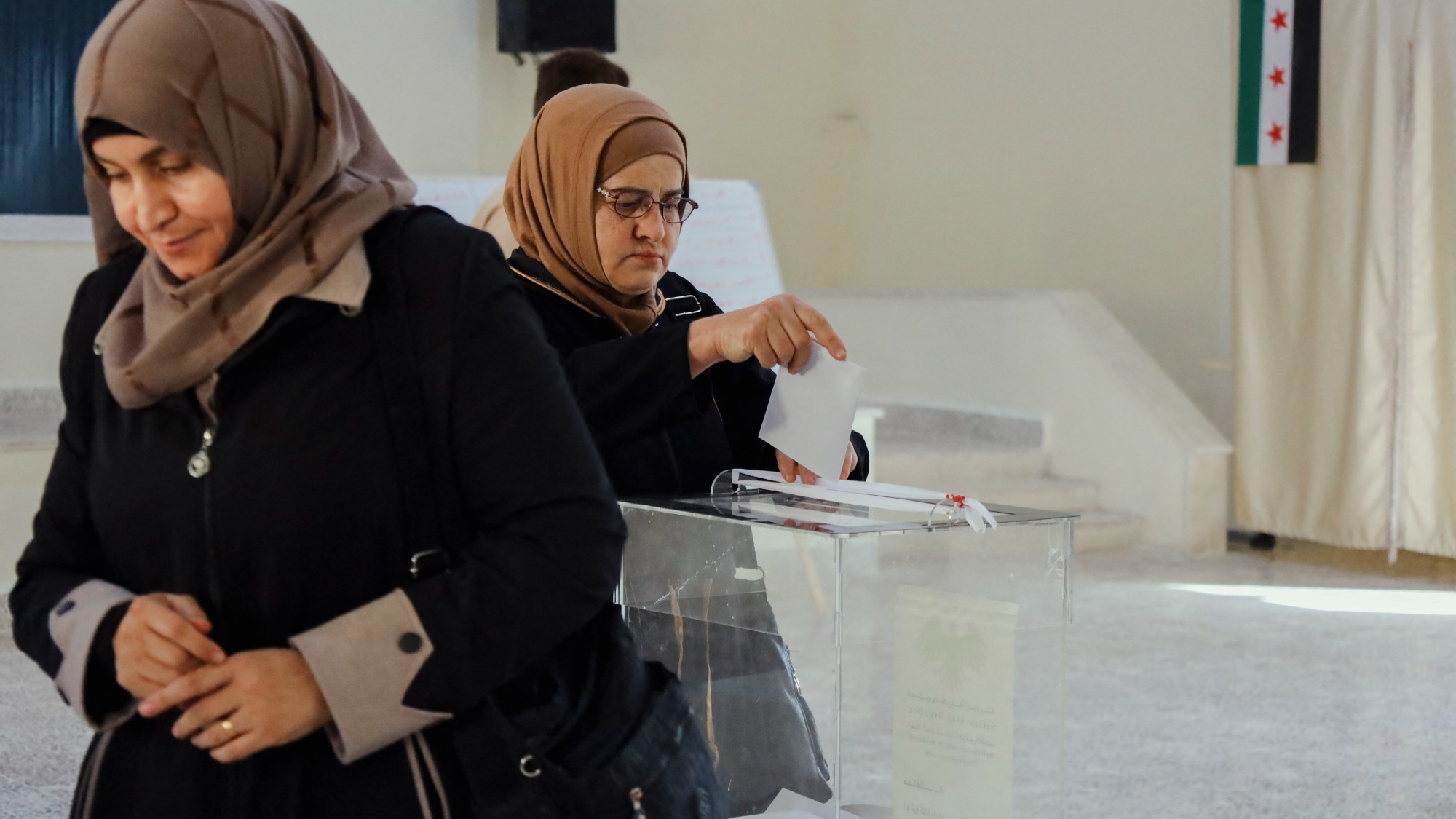The rehabilitation of Syria’s Bashar al-Assad
Critics say the president’s return to Arab League after 12 years of brutal civil war shows that ‘crime pays’

A free daily email with the biggest news stories of the day – and the best features from TheWeek.com
You are now subscribed
Your newsletter sign-up was successful
The president of Syria is attending his first Arab League summit having been suspended from the organisation for the past 12 years.
Saudi Arabia invited Bashar al-Assad to the gathering after Arab states agreed to reinstate Syria’s full membership of the league.
However, the move is controversial, said The Guardian, coming as Western and Gulf states “clash” over Assad’s “rehabilitation after more than a decade of war against his own people”.
The Week
Escape your echo chamber. Get the facts behind the news, plus analysis from multiple perspectives.

Sign up for The Week's Free Newsletters
From our morning news briefing to a weekly Good News Newsletter, get the best of The Week delivered directly to your inbox.
From our morning news briefing to a weekly Good News Newsletter, get the best of The Week delivered directly to your inbox.
What’s happening and why?
Syria’s membership of the Arab League was suspended in 2011 – “early on in the uprising-turned-conflict” that has “killed nearly a half million people since March 2011 and displaced half of the country's pre-war population of 23 million”, said NPR.
However, Assad has been readmitted after several of the Arab states that had backed opposition forces in Syria, including Saudi Arabia, accepted that the president’s grip on power was secure.
He “didn’t work his way back into the fold through meaningful concessions or reforms”, said Axios. “He’s still in power and back at the table due to a decade of determined brutality and shifting regional winds.”
“The rapprochement accelerated following the devastating earthquake that hit Turkey and north-western Syria in February,” said the BBC, “when once-hostile powers decided to send humanitarian aid to Syrian government-controlled areas.”
A free daily email with the biggest news stories of the day – and the best features from TheWeek.com
Arab League Secretary-General Ahmed Aboul Gheit said that he hoped that “Syria’s regaining of its seat is a precursor to the end of its conflict”.
What does it mean?
Assad’s return will “mainly be about symbolism”, said Al Jazeera. It came about because “the emerging consensus in Arab capitals today, rightly or wrongly, is that addressing Syria’s problems requires engagement with Damascus”.
Arab leaders “hope that by mitigating the conflict, they can begin to reverse the associated drug trafficking networks, refugee crises, weakened border security, and intensified role of Iranian forces and Tehran-backed militias in Syria”, analysts told the news site.
Who supports it?
Saudi Arabia championed Assad’s return to the 22-nation pan-Arab body, believing that the region’s leaders have to “accept pragmatically that Assad has survived the Syrian civil war”, said The Guardian. The “best way to influence the consequences of his victory is through an engagement with Damascus that will bear fruit over time”, said the paper.
Ultimately, said the Daily Beast, the development is “an undeniable political victory for the Islamic Republic of Iran – gained via military means – after backing Bashar al-Assad’s regime during the Syrian Civil War”.
Who doesn’t?
There are “objections” to the move in Washington and London, said The Guardian. Those governments believe the Syrian leader has “shown no contrition” for the millions who have been killed and displaced by his forces since pro-democracy protests started in 2011.
Joe Biden’s Syria policy has been “dealt its biggest blow yet” with the move, which has been described by Assad’s diplomats in New York as “bearing with it a message for the US to end its ongoing military presence and sanctions targeting the country”, said Newsweek.
Raphaël Glucksmann, a French member of the socialist alliance in the European parliament, also objected. “Crime pays, that’s the message that is being sent,” he said.
In a strongly worded attack, he added that al-Assad is “the worst criminal against humanity today” and “represents 500,000 dead, children gassed in Ghouta, Sednaya prison, places of death, slaughterhouses for human beings, rape set up as a system”.
Syria faces objections closer to home, too. Qatar, Kuwait and Morocco “have not renormalised relations with Damascus”, said Al Jazeera, and “still maintain that al-Assad’s government is illegitimate”.
“Qatar has positioned itself as the Arab World’s most hardline opponent of [al-]Assad’s regime,” Aron Lund, a fellow at Century International and a Middle East analyst, told Al Jazeera.
The nation’s foreign minister told a news conference in Doha that it had dropped its opposition only because it did not want to “deviate from the Arab consensus”.
What might happen next?
There could be consequences for refugees, according to the opposition in Syria. The “advent of normalisation” is already leading to reports that Syrian refugees in countries such as Lebanon are being “forcibly rounded up to be put on lorries to return to their home country”, said The Guardian.
Meanwhile, there are no signs that the White House is ready to moderate its stance. “Our position is clear – we are not going to normalise relations with the Assad regime, and we certainly don’t support others doing that as well,” state department spokesperson Vedant Patel told the media.
Chas Newkey-Burden has been part of The Week Digital team for more than a decade and a journalist for 25 years, starting out on the irreverent football weekly 90 Minutes, before moving to lifestyle magazines Loaded and Attitude. He was a columnist for The Big Issue and landed a world exclusive with David Beckham that became the weekly magazine’s bestselling issue. He now writes regularly for The Guardian, The Telegraph, The Independent, Metro, FourFourTwo and the i new site. He is also the author of a number of non-fiction books.
-
 Antonia Romeo and Whitehall’s women problem
Antonia Romeo and Whitehall’s women problemThe Explainer Before her appointment as cabinet secretary, commentators said hostile briefings and vetting concerns were evidence of ‘sexist, misogynistic culture’ in No. 10
-
 Local elections 2026: where are they and who is expected to win?
Local elections 2026: where are they and who is expected to win?The Explainer Labour is braced for heavy losses and U-turn on postponing some council elections hasn’t helped the party’s prospects
-
 6 of the world’s most accessible destinations
6 of the world’s most accessible destinationsThe Week Recommends Experience all of Berlin, Singapore and Sydney
-
 The ‘mad king’: has Trump finally lost it?
The ‘mad king’: has Trump finally lost it?Talking Point Rambling speeches, wind turbine obsession, and an ‘unhinged’ letter to Norway’s prime minister have caused concern whether the rest of his term is ‘sustainable’
-
 ‘These accounts clearly are designed as a capitalist alternative’
‘These accounts clearly are designed as a capitalist alternative’Instant Opinion Opinion, comment and editorials of the day
-
 The US-Saudi relationship: too big to fail?
The US-Saudi relationship: too big to fail?Talking Point With the Saudis investing $1 trillion into the US, and Trump granting them ‘major non-Nato ally’ status, for now the two countries need each other
-
 Memo signals Trump review of 233k refugees
Memo signals Trump review of 233k refugeesSpeed Read The memo also ordered all green card applications for the refugees to be halted
-
 ‘The money to fix this problem already exists’
‘The money to fix this problem already exists’Instant Opinion Opinion, comment and editorials of the day
-
 Trump defends Saudi prince, shrugs off Khashoggi murder
Trump defends Saudi prince, shrugs off Khashoggi murderSpeed Read The president rebuked an ABC News reporter for asking Mohammed bin Salman about the death of a Washington Post journalist at the Saudi Consulate in 2018
-
 Trump says he will sell F-35 jets to Saudi Arabia
Trump says he will sell F-35 jets to Saudi ArabiaSpeed Read The president plans to make several deals with Saudi Crown Prince Mohammed bin Salman this week
-
 Syria’s strange post-Assad election
Syria’s strange post-Assad electionThe Explainer Sunday’s limited vote ‘suited the phase Syria is undergoing’, says interim president